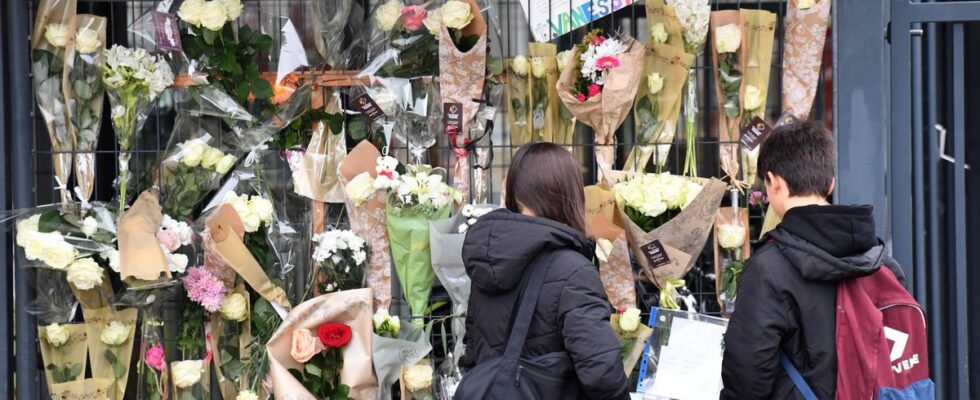A month apart, two schoolgirls who were leaving their school after class, in the middle of the day, on a Friday, were kidnapped and killed by people they had never seen in their lives. The murders of young Lola, in Paris, on October 14, and that of Vanesa, in Tonneins, in Lot-et-Garonne, last week, shocked a large part of the French.
Over the reports, the testimonies of parents and adolescents have multiplied to express the horror of sordid and incomprehensible crimes. But also their feeling that it could have been “them”. Because as Lola’s mother recalled during the white march in homage to her daughter, “Lola is also the sister, the daughter, the granddaughter of all French women and all French people. Each one of us felt personally affected, wounded”.
“It puts into perspective the fact that this can happen to my child”
An identification that is not without consequence on the anxiety that young people, but also their parents, can feel. “We all have it in the back of our minds that this can happen, that’s why from an early age we teach them not to get into a car [d’un inconnu], to be careful. But when you’re in 6th or 5th grade, you’re a little more naive than when you’re a high school student, you don’t think about malevolence. These miscellaneous facts, and their sequence, bring out in us all the anxieties that we can have, it puts into perspective the fact that it can happen to my child, that it can happen to me, ”admits Isabelle Fery, door- word of the federation of parents of students in public education (PEEP).
For this association manager, it is therefore difficult not to project herself. All the more so when the tragedy happened in his village, in his establishment. Monday morning, in Tonneins, more parents accompanied their children to Germillac college, the latter citing their fear of now making the journey alone. Apprehensions that some of them were able to express that day with the psychologists of the psychological unit set up by the National Education within the college. “There were tears, emotion, there are questions”, explained Anne Bisagni-Faure, the rector of the Bordeaux academy who assured that this device would remain open “as many days as needs. “.
So as not to leave the parents alone with their anger and apprehensions, the town hall of this village of 10,000 inhabitants, helped by volunteers from the Red Cross, has also deployed a listening cell where nearly 70 adults from the town and surroundings visited, in particular to find out “how to accompany their children”.
Extend psychological cells to parents?
Because, in such situations, it is difficult to always find the right words. “When a tragedy occurs, we always ask for the children to be taken care of by National Education psychologists. But we would like this to be extended to parents, who are also often traumatized”, insists Magalie Icher, the president of the FCPE for whom “talking is good therapy”.
His association is often approached after this type of event by parents who are helpless in the face of questions from their children. “It goes up very quickly, especially when a news item reaches the community, whether it is children, parents or teachers. Each time, it’s a tragedy. This highlights the fact of not having been able to protect a child. This also fuels the feeling of insecurity, but, fortunately, these events are rare, the majority of acts of violence take place in the intra-family sphere, ”recalls the association manager. Some of its adherents often wonder whether to talk about what happened or simply avoid the subject so as not to generate fears.
Resilience capacity
But in the age of social networks and media coverage, it is certain that teenagers can no longer be put under glass. Smartphones, which their parents often bought for them to reassure themselves and know where they are, are also an open door to the news.
“Today there is a lot of information circulating, we are all aware of these facts. Before, they already existed, but we did not know it or less. Children know that this exists, you have to share emotions with them in a healthy way, you have to reassure. On the other hand, if children are told 300 times a day to be careful, this can generate anxiety. You have to talk to them about it, remind them that there are safety rules to follow, but not create psychosis. It’s an in-between to find, ”argues Christine Barois, psychiatrist.
For this specialist in stress and anxiety, nothing should be hidden, nothing should be concealed, you should rather show your daughter or son that it is possible to manage your emotions, “through breathing or meditation”, she cites as an example. “We live in a world where you can be in danger. After the attacks of November 13, we were all careful before going to a concert hall. We’ve all gone through crises, whether it’s the attacks or the Covid, it’s part of life. We must rely on the resilience of adolescents. And then we also have in us this capacity for forgetting”, concludes the psychiatrist who believes that solidarity in these moments can play an important role.

